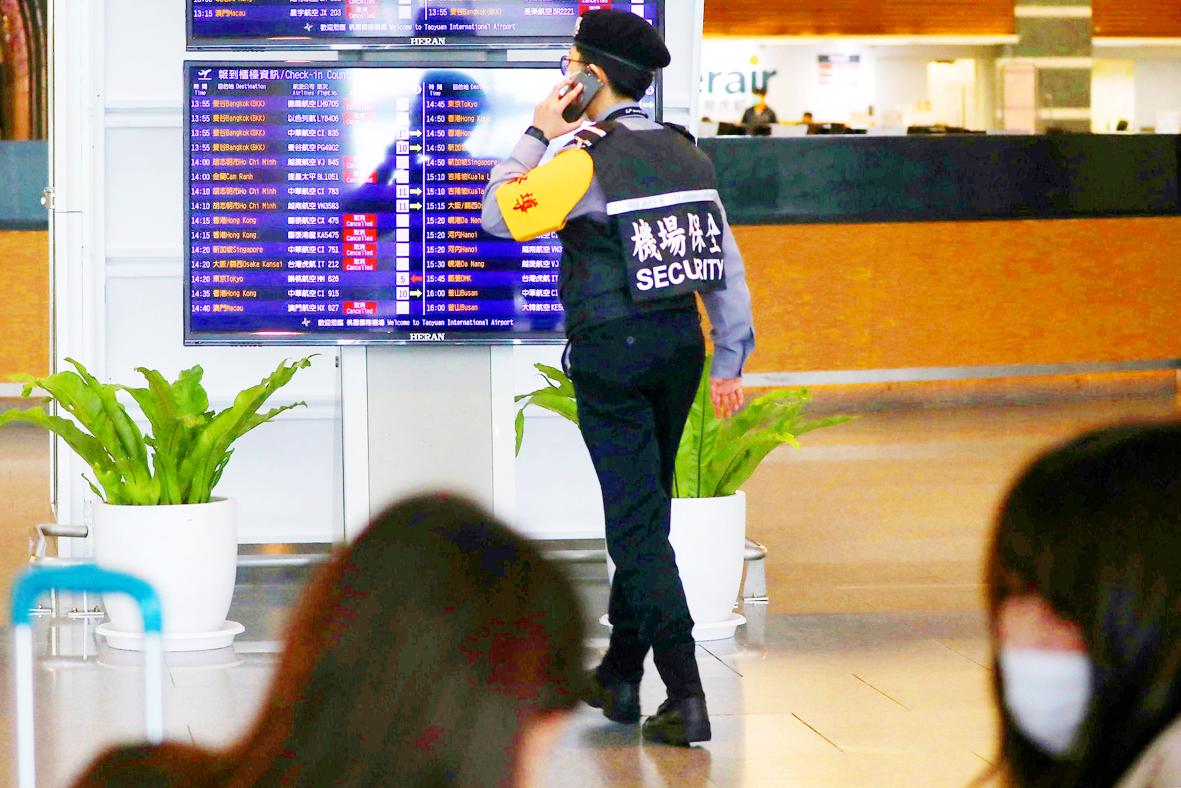All foreign nationals would be barred from entering Taiwan after midnight tonight, except for holders of the various Alien Resident Permits (ARCs), diplomats and a limited number of others, while all arrivals would be required to undergo a 14-day quarantine, the Central Epidemic Command Center (CECC) announced this morning.
Minister of Health and Welfare Chen Shih-chung (陳時中), head of the center, said the move was necessary after a spike in confirmed cases of COVID-19 among Taiwanese who had recently returned from abroad.
A total of 23 new COVID-19 cases, 21 of which originated overseas, were confirmed today, bringing the total number in the nation to 100, after 10 cases, all imported, were reported on Tuesday.

Photo: Ann Wang, Reuters
Minister of Foreign Affairs Joseph Wu (吳釗燮) said some foreign nationals would not be subject to the ban, including ARC holders, those with documentation proving they are in Taiwan for diplomatic or other official purposes, those coming to fulfill business contractual obligations and those who have received special permits
The new entry restrictions would be subject to change, based on CECC directives, Wu said.
Chen said that anyone arriving from overseas — Republic of China citizens or authorized foreign nationals — would be required to be quarantined at home for 14 days.
In addition, anyone who arrived in Taiwan after being in or transiting through EU nations, Turkey or Dubai between March 3 and Sunday must quarantine themselves at home for 14 days, effective immediately, Chen said.
Those required to go into quarantine would receive NT$1,000 compensation per day from the government, Chen said.
These people should immediately contact their local township offices and report their travel history to the authorities, he added.
This story has been updated since it was first published.

The Taiwanese passport ranked 33rd in a global listing of passports by convenience this month, rising three places from last month’s ranking, but matching its position in January last year. The Henley Passport Index, an international ranking of passports by the number of designations its holder can travel to without a visa, showed that the Taiwan passport enables holders to travel to 139 countries and territories without a visa. Singapore’s passport was ranked the most powerful with visa-free access to 192 destinations out of 227, according to the index published on Tuesday by UK-based migration investment consultancy firm Henley and Partners. Japan’s and

NATIONAL SECURITY THREAT: An official said that Guan Guan’s comments had gone beyond the threshold of free speech, as she advocated for the destruction of the ROC China-born media influencer Guan Guan’s (關關) residency permit has been revoked for repeatedly posting pro-China content that threatens national security, the National Immigration Agency said yesterday. Guan Guan has said many controversial things in her videos posted to Douyin (抖音), including “the red flag will soon be painted all over Taiwan” and “Taiwan is an inseparable part of China,” while expressing hope for expedited “reunification.” The agency received multiple reports alleging that Guan Guan had advocated for armed reunification last year. After investigating, the agency last month issued a notice requiring her to appear and account for her actions. Guan Guan appeared as required,

Japan and the Philippines yesterday signed a defense pact that would allow the tax-free provision of ammunition, fuel, food and other necessities when their forces stage joint training to boost deterrence against China’s growing aggression in the region and to bolster their preparation for natural disasters. Japan has faced increasing political, trade and security tensions with China, which was angered by Japanese Prime Minister Sanae Takaichi’s remark that a Chinese attack on Taiwan would be a survival-threatening situation for Japan, triggering a military response. Japan and the Philippines have also had separate territorial conflicts with Beijing in the East and South China

A strong cold air mass is expected to arrive tonight, bringing a change in weather and a drop in temperature, the Central Weather Administration (CWA) said. The coldest time would be early on Thursday morning, with temperatures in some areas dipping as low as 8°C, it said. Daytime highs yesterday were 22°C to 24°C in northern and eastern Taiwan, and about 25°C to 28°C in the central and southern regions, it said. However, nighttime lows would dip to about 15°C to 16°C in central and northern Taiwan as well as the northeast, and 17°C to 19°C elsewhere, it said. Tropical Storm Nokaen, currently